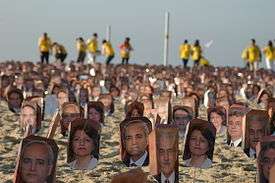Baháʼí 7
The Baháʼí 7[1], also known as the "Yaran" (friends), are seven Iranian Baháʼí community leaders arrested in 2008 that have served 10-year prison sentences in Iran. The seven prisoners of conscience are Mahvash Sabet, Fariba Kamalabadi, Jamaloddin Khanjani, Afif Naeimi, Saeid Rezaie, Behrouz Tavakkoli, and Vahid Tizfahm.[2]

Arrests and detention
Sabet was detained on 5 March 2008 after being summoned to Mashhad by the Ministry of Intelligence. Officers from the Ministry of Intelligence arrested the other six leaders in raids on their homes on 14 May 2008.[3]
The seven were held in Evin Prison in Section 209, which is run by the Ministry of Intelligence, and were denied access to a lawyer. The five male detainees reportedly were placed in one cell together measuring 10m² and without any beds.[4]
Charges and trial
On 11 February 2009, the Deputy Prosecutor of Tehran said that the case against the "seven defendants in the case of the illegal Bahai group" would be sent in next week to the Revolutionary Court and they would be charged with "espionage for Israel, insulting religious sanctities and propaganda against the system." In response, Amnesty International stated that it "considers the charges to be politically motivated and those held to be prisoners of conscience, detained solely because of their conscientiously held beliefs or their peaceful activities on behalf of the Baha'i community. If convicted, they would face lengthy prison terms, or even the death penalty."[4]
In May 2009, the families of the detainees were told that the seven were now facing the additional charge of mofsed-e-filarz (spreading corruption on earth), which can carry the death penalty. The families were also informed that their detained relatives were scheduled to appear on 11 July 2009 before Branch 28 of the Revolutionary Court in Tehran to face the charges.[5] The scheduled 11 July appearance was delayed and no new trial was given.[6]
The first session of the trial was held on January 12, 2010 before the Revolutionary Court in Tehran. Government authorities reportedly attempted to bar the Baháʼís' lawyers from the courtroom, but were permitted access after insisting upon entering. Sessions were also held on February 7 and 12 April 2010. At the latter session, the seven Baháʼí and their lawyers reportedly "refused to participate in the proceedings when they saw Ministry of Intelligence interrogators and a film crew at what was supposed to be a closed hearing."[7]
On 7 August 2010, the Revolutionary Court in Tehran convicted the seven Baháʼí of crimes including "espionage for Israel", "insulting religious sanctities" and "propaganda against the system," and sentenced them to 20 years imprisonment. In response, Amnesty International called for their immediate release, describing the verdict as "a sad and damning manifestation of the deeply-rooted discrimination against Baha'is by the Iranian authorities." [8]
In September 2010, an appeal court acquitted the seven Baháʼí of some of the charges, including espionage, and consequently, their sentences were reduced to 10 years. In March 2011, however, Iranian authorities reinstated the 20-year sentences.[9]
On September 18, 2017, former prisoner Mahvesh Sabet was released. [10] Two days later Senator John McCain commented on being unified with the Baháʼís on her release and condemning her imprisonment.[11]. During her imprisonment, Mahvash Sabet wrote many poetry books that were smuggled out and published. She is an acclaimed writer and a poet.
Reactions
In May 2013, a group of United Nations human rights officials called on Iranian authorities to immediately release the seven Baháʼí members.[2]
See also
References
- Lantos Swett, Katrina (30 May 2013). "Why the Bahaʼi 7 matter". CNN.
- "UN experts urge Iranian authorities to free jailed Bahaʼi community leaders". UN News Centre. 13 May 2013.
- "Iran: Arbitrary arrests / Prisoners of conscience". Amnesty International. 15 May 2008.
- "Iran: Further Information on arbitrary arrests/prisoners of conscience". Amnesty International. 12 February 2009.
- "Iran: Seven Baha'is Leaders Risk Execution". Amnesty International. 3 July 2009.
- "Trial of seven Baha'i religious minority members delayed in Iran". Amnesty International. 14 July 2009.
- "Seven Baha'i Leaders Given Harsh Prison Sentence". Amnesty International USA. Archived from the original on 2016-07-06. Retrieved 2014-07-15.
- "Sentences against jailed Iranian religious minority leaders condemned". Amnesty International. 10 August 2010.
- "Iranian Baha'i leaders hit by 'vindictive' sentence extension". Amnesty International. 31 March 2011.
- "Iranian Bahaʼi Leader Released After Completing 10-Year Sentence". RadioFreeEurope/RadioLiberty. Sep 18, 2017. Retrieved Sep 22, 2017.
- "Statement by SASC chairman John McCain on the release of Mahvash Sabet from prison in Iran". Official webpage of US Senator of Arizona, John McCain (Press release). Sep 20, 2017. Archived from the original on September 22, 2017. Retrieved Sep 22, 2017.
External links
- "Special Report: Trial of Iran's seven Bahaʼi leaders". Bahaʼi World News Service.
- Timeline on Baháʼí Library Online